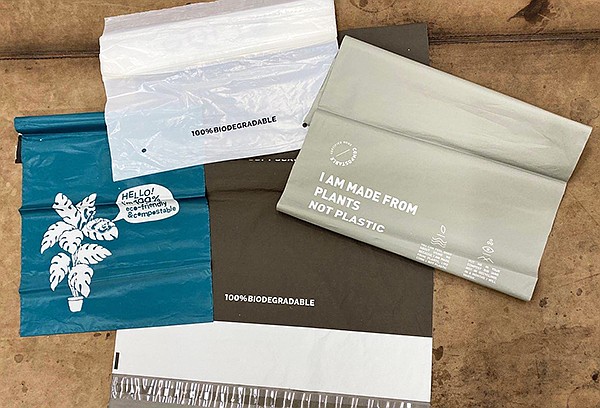NOTIONS
Labeltex’s New Sustainable Offerings Contribute to an Eco-Friendlier Supply Chain
Passionate about the work he does through the company where he is partner, Michel Imani has watched his business grow into an operation where the focus is more than simply creating labels. At Los Angeles’ Labeltex Mills, Inc., Imani has noticed a shift toward sustainability that is shaping the future of the nearly 26-year-old company.
“We’re heavily into sustainable products,” he said. “We are putting all of our effort, time, money and attention to come up with new lines in all the labels, leather patches, hardware, buttons, rivets, hangtags, trims and packaging we manufacture in a sustainable way.”
Over the years, Labeltex has worked with notable names in the apparel industry such as 7 For All Mankind, Current/Elliott, DSTLD, Frame Denim, Lucky Brand Jeans, Reformation and True Religion. Not only is Labeltex cultivating relationships with venerable brands that have helped build the business through the manufacturing of traditional labels, trims and packaging, but Imani is also continuing to grow these existing connections and forge new partnerships by creating eco-friendlier offerings.
Labeltex supplies Cerritos, Calif.–based Revolve’s Grlfrnd brand as the company continues to set ambitious sustainable-sourcing goals. Los Angeles–based Ética, whose mission is centered on maximizing green and ethical practices in apparel production throughout its supply chain, is also a partner of Labeltex.
“I produced all of their labels with 100 percent recycled polyester, and all their hardware has a nontoxic finish, and all the paper hangtags are compostable. They are the first one I believe that we developed a full line of sustainable trims for,” Imani said. “They said, ‘We want everything sustainable.’ Everything in one way or another is sustainable.”
In addition to creating recycled polyester and cotton clothing labels and compostable hangtags, Labeltex also manufactures leather patches. One of the most pollutive processes within the apparel industry is the treatment of leather to create a softer hand, rich color and preserve the skins to prevent degradation. To bypass the toxic nature of these methods, including chrome tanning, Labeltex works with a leather partner in Turkey who offers a product that relies on a safer, chrome-free process. The company is also exploring man-made leather alternatives that are more sustainable, some of which are made from plant-based sources.
“We have a lot of man-made, fake leather that we do that looks like real leather. We do a lot of cork patches, which comes from a natural plant source,” he said. “Everything comes with certificates and proof of testing.”
While Imani is excited about promoting a cleaner apparel industry through providing one of the integral components of manufacturing garments, creating ecologically sound labels, tags, packaging and hardware is not always easy. Manufacturing more-sustainable products often limits the materials and colors that can be used to create labels.
“It’s challenging because you can’t get many different colors in sustainable or recycled polyester threads,” Imani explained. “If you’re looking for orange tape, it needs certain dyes and chemicals to produce the color.”
Another issue that arises when supplying the apparel industry with sustainable materials is the cost. Many brand decision-makers perceive the pricing as much higher when considering the incorporation of sustainable products into clothing production.
“You add 10 to 15 percent more to your cost, which is not much,” he explained. “It accumulates, but it helps [the environment]. Everybody wants compostable and sustainable products.”
The first major accomplishment for Labeltex was a bit more than one year ago, which signaled the creation of biodegradable plastic for its packaging options. While these products could break down following disposal, there would still exist smaller remnants of the original product. Approximately four months ago, Labeltex introduced compostable plastic, which will eventually decompose completely.
“We had a biodegradable option that becomes small particles of plastic, but they still stay in landfills. The actual residue is there,” Imani explained. “We came back and offered biodegradable plastic, but we were approached by customers who wanted compostable, which decomposes in the landfill and doesn’t leave residue. Compostable dissolves and disappears. It’s the best you can get.”
While this accomplishment will help move the business forward, Imani is looking toward the future of being part of a sustainable supply chain. He implores his peers to make changes to their manufacturing in order to provide greener labels, tags and hardware, while encouraging apparel makers to choose eco-friendly options for these types of products.
“This is the reality of our industry. If we don’t jump on it, sooner or later we will die from our mistakes. We need to be together on this. This is our industry. It’s our life and it’s the life of our grandkids,” he said. “We can’t do much when we are doing something ourselves. Alone we throw stones, together we move mountains.”






















